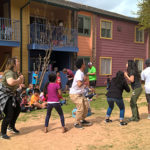HOUSTON—For residents of neighborhoods served by Houston Mission Centers, human trafficking isn't something that happens on the other side of the world. Sex and labor trafficking are atrocities that victimize their family members, friends and neighbors.
Earlier this year, the mission centers surveyed about 180 people they serve. They found 16 percent of respondents knew people who were victims of labor trafficking. More than 6 percent of survey participants reported being victims of trafficking. Another 5 percent indicated they knew someone who had been forced into the sex trade. Some of the victims they knew were minors.
"This does take place in our cities," said Kate Ambrose, who conducted the survey. "This is not just an issue we read about … (or view) on CNN. This is affecting people in our communities."
Statistics represent just a small indication of the severity of the trafficking issue in the five ZIP Codes served by the mission centers, Ambrose said. People were reluctant to discuss their knowledge of Houston-area trafficking. Some would not confirm knowing people who were being victimized, but they gave Ambrose subtle signs they knew more than they were admitting.
People served by the mission centers often are vulnerable to become victims of trafficking because they already are in difficult situations, Ambrose noted. Unscrupulous employers can promise them money for work, then not pay them and threaten to report them as undocumented immigrants. Young women are lured into sex trafficking with the promise of a better life.
Ambrose is developing a plan for mission centers to prevent trafficking in their communities. She already has started educating area churches and connecting with other anti-trafficking organizations and law enforcement. More than 10 Christian groups participate in a supply drive for an area safe house for trafficking victims.
The mission centers also are selling Christmas cards and devoting the proceeds to local anti-trafficking efforts. The centers are seeking to construct a program that reaches young people before traffickers approach them.
Connecting with children early is key in preventing trafficking, said Ginger Smith, executive director of the mission centers. So, the mission centers are seeking to help neighbors help themselves.
"We also want to empower our communities to be advocates for their communities," she said. "They're the eyes and ears in their neighborhoods. They know what happens behind closed doors."
Sign up for our weekly edition and get all our headlines in your inbox on Thursdays
Tackling an issue as large as trafficking requires people—inside and outside communities— working together for the betterment of all, Smith said.
"We should all be alarmed by this," she said. "We should all find something to do about this."
For more information about the mission centers' anti-trafficking efforts, visit www.missioncenters.org. To order Christmas cards, contact Ambrose at [email protected].














We seek to connect God’s story and God’s people around the world. To learn more about God’s story, click here.
Send comments and feedback to Eric Black, our editor. For comments to be published, please specify “letter to the editor.” Maximum length for publication is 300 words.